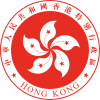Hong Kong–North Korea relations
 | |
Hong Kong |
North Korea |
|---|---|
Hong Kong–North Korea relations are bilateral relations between Hong Kong and Democratic People's Republic of Korea.
History
From the establishment of Democratic People's Republic of Korea in 1945 until after the establishment of the Hong Kong Special Administrative Region in 1997, there were no official relations.[1] During the Korean War and the Cold War, the two sides were on opposing sides. Hong Kong, as first a colony then a dependent territory of the United Kingdom, formed part of the capitalist camp led by the United States, while North Korea was an ally of the Soviet Union and People's Republic of China. Hong Kong joined the embargo imposed on the communist bloc during the second half of the 20th century.
Following the transfer of sovereignty of Hong Kong to China, North Korea was able to open a Consulate-General in February 2000 by virtue of its diplomatic relations with Beijing, having previously not been allowed to establish a trade mission during British rule.[1] The Consulate General is located in Wan Chai on Hong Kong Island.
Defectors from North Korea
Hong Kong had been involved in two cases of North Korean defectors. The first was in 1996, by then a family of 16 people escaped from North Korea to Hong Kong via China. Among them five children and one pregnant woman applied for political asylum and were further transferred to South Korea.[2]
The second case was in late July 2016. A North Korean defector, who went to Hong Kong as a member of the North Korean delegation for the International Mathematical Olympiad at Hong Kong University of Science and Technology, had sought refuge at the Consulate General of the Republic of Korea (South Korea) in Hong Kong, which located on the fifth floor of the Far East Finance Centre in Harcourt Road, Admiralty, Hong Kong Island.[3][4] The defector eventually left for South Korea on probably 24 September 2016 after about 80 days stay in Hong Kong.[5]
Economic relations
Hong Kong and North Korea cooperate in several international organisations, with a focus on social and cultural issues. Despite Hong Kong being the freest market economy in the world[6] and North Korea is a planned economy, the economic success of Hong Kong serves as an exemplar for the development of the Sinuiju Special Administrative Region, which is a 50-square-mile area under discussion as a free-trade zone since 1997. Many have wishfully hailed the autonomous zone in Sinuiju as the future Hong Kong of North Korea.[7]
References
- ^ a b North Korea's Macau-based trading venture opens its doors to deny reports of espionage and shady deals, South China Morning Post, 3 September, 2000
- ^ 涉外交 料港府交內地解決Apple Daily, 28/7/2016.
- ^ North Korean defects at Hong Kong’s South Korean consulate, South China Morning Post, 27/7/2016.
- ^ 脫北者年約18歲朝鮮少年 曾到科大參加奧數比賽 數天前闖韓駐港總領事館求庇護 Mingpao Daily, 28/7/2016.
- ^ 脫北青年留港80多日打機消磨 傳上周抵南韓, Apple Daily, 28/9/2016
- ^ "Hong Kong Economy: Population, Facts, GDP, Business, Trade, Inflation". www.heritage.org. Retrieved 22 May 2015.
- ^ "Californian May Oversee N. Korea Economic Zone". Retrieved 12 July 2016.


